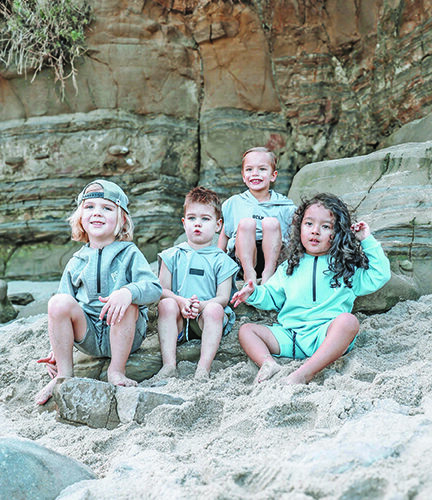As the Russian invasion of Ukraine continues to unfold, many local hiring managers may be wondering how the war will affect the arrival of workers participating in the J-1 Summer Work and Travel Visa program.
After two years of program interruptions by the COVID-19 pandemic, area businesses are looking forward to the return of the J-1 students for the upcoming summer season. From restaurants to motels to amusement parks, many businesses employ the foreign students to fill gaps left by the lack of local workers.
“No one really knows what’s going to happen with the Russian students,” said Brian Hartley, vice president of Playland’s Castaway Cove on the boardwalk in Ocean City. “We’ve had a lot of Russian students in the past and it’s a very difficult situation.”
Castaway Cove employees about 300 people each season and about 5 percent are J-1 visa students. The number fluctuates depending on the nature of the business and the positions available.
“We have about 15 to 20 J-1 workers,” Hartley said. “We don’t know what the sanctions or appetite is going to be for those kids to come over here or for our government to allow them to come over.”
Businesses recruit J-1 students prior to them obtaining visas, which requires a face-to-face appointment at the U.S. Department of State.
“The last few years things were slowly rolled out of the gate, and it made it hard for the embassies to open and get paperwork done,” Hartley said. “We hope to be back to normal conditions this summer but conditions in eastern Europe are a lot different than what anyone could’ve anticipated.”
Students originate
in many countries
At Morey’s Piers and Water Parks in Wildwood, Vice President of Human Relations Denise Beckson said she is cautiously optimistic about having a full roster of 500 to 600 J-1 visa workers.
“We’ve been recruiting since October and have been talking with legislators about the impact on our business,” she said. “It’s important to us to make sure we make our congressmen and senators aware [of the need].”
Beckson said Ukraine sends fewer than 1,000 J-1 workers each year, whereas Russia is in the top 10 countries sending the most students.
“First and foremost, our thoughts and hopes for safety are with the people in those regions,” she said. “Russia hasn’t been processing application forms this year and no one this year should expect many Russian workers.”
Beckson said Russian students must go to a different country for an interview to get a J-1 visa.
“It’s very cost-prohibitive and scheduling is difficult with bans on Russia airlines,” she said. “I think some Russian students will get over but much fewer [than in the past]. I don’t think it’s going to have a huge impact unless something escalates, if Russia were to go into Poland or Slovakia.”
Cape May County Chamber of Commerce President Vicki Clark said businesses are reaching out to countries outside Eastern Europe, such as Jamaica and the Bahamas.
Local workers
difficult to find
Finding workers has been problematic throughout the pandemic and exacerbated by the lack of J-1 students over the past two seasons. The program allows businesses to supplement their workforce, particularly at the end of the summer when local workers leave for college or return to sports practice.
“I’ve never turned away an American kid to take place of a job of J-1 visa worker,” Hartley said. “We have so many opportunities here and are hiring throughout the season and hiring as many local kids as we can.”
Beckson said the number of domestic applications increases each year and already is higher than last year.
“We’ve struggled for decades to get enough workers because the area has a fairly low population,” she said. “The pandemic magnified the problem with less people in the workforce, but things seem to be bright-siding and we hope to have a more normal year.”
Lack of workers
forces changes
Hours of operation for amusement parks have changed in the past two years due to local regulations and mandates. Castaway Cove plans to open at 3 p.m. daily starting this season and continuing forward.
“In 2020 we opened at 6 p.m., not due to staffing issues but more restraints with masks,” Hartley said. “With our operators and customers wearing masks and being out in the sun all day, we shifted to the nighttime operation when it was cooler.”
Hartley said he was unsure whether the number of J-1 students this summer would return to pre-pandemic numbers.
“[The war has] changed a lot of things for certain countries and people are just working through it and dealing with it as best we can,” Hartley said.
Clark said she hopes the county will have 2,800 students this year. A full complement of international students included about 5,300 workers in the past.
Morey’s Piers has 1,500 seasonal positions to fill, and Beckson said 500 to 600 of those openings are typically J-1 visa workers.
“The numbers are skewed a bit because 1,500 positions is not necessarily 1,500 people,” she said. “It’s hard to measure exactly what we need but things are looking adequate for staffing.”
The availability of workers has changed, and to combat it, Morey’s Piers has become more flexible with hiring.
“We’ve gotten more flexible with availability for our U.S. employees,” she said. “If someone can work part time or flexible hours, we’re much more willing to work with them on that.”
Morey’s Piers is working to create more career positions available for year-round residents.
“We just haven’t been there in the past [years] with a shortened calendar, diminished hours and closed rides,” Beckson said. “Our New Jersey legislators recognize that and we hope to see the movement we need to get students here.”
– By RACHEL SHUBIN/Special to the Sentinel


